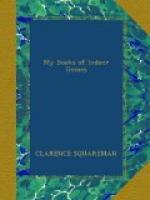What is the worst weather for rats and mice? When it rains cats and dogs.
What is that which never uses its teeth for eating purposes? A comb.
When are two apples alike? When pared.
What is the difference between a blind man and a sailor in prison? One cannot see to go and the other cannot go to sea.
Why is a plum cake like the ocean? Because it contains so many currants.
What pudding makes the best cricketer? A good batter.
When is a sailor not a sailor? When he’s a-board.
Why is the snow different from Sunday? Because it can fall on any day in the week.
What trade would you mention to a short boy? Grow sir (grocer).
What tree is nearest the sea? The beech.
Why is a game of cards like a timber yard? Because there are always a great many deals in it.
Why is a tight boot like an oak tree? Because it produces a corn (acorn).
Why is a city in Ireland likely to be the largest city in the world? Because each year it is Dublin (doubling).
What is the easiest way to swallow a door? Bolt it.
Why is a dancing master like a tree? Because of his bows (boughs).
Name a word of five letters from which if you take two but “one” remains. Stone.
Why is A like twelve o’clock? It is the middle of “day”
When is a man thinner than a lath? When he is a-shaving.
* * * * *
THOUGHT READING
This is a very good game, which always causes considerable amusement, and if skillfully carried out will very successfully mystify the whole company.
It is necessary that the player who is to take the part of thought-reader should have a confederate, and the game is then played as follows:
The thought-reader, having arranged that the confederate should write a certain word, commences by asking four members of the company to write each a word upon a piece of paper, fold it up in such a manner that it cannot be seen, and then to pass it on to him. The confederate, of course, volunteers to make one of the four, and writes the word previously agreed upon, which is, we will suppose, “Ohio.”
The thought-reader places the slips of paper between his fingers, taking care to put the paper of his confederate between the third and little finger; he then takes the folded paper from between his thumb and first finger and rubs it, folded as it is, over his forehead, at each rub mentioning a letter, as O, rub, H, rub, I O, after which he calls out that some lady or gentleman has written “Ohio.” “I did,” replies the confederate.
The thought-reader then opens the paper, looks at it, and slips it into his pocket; he has, however, looked at one of the other papers.
Consequently he is now in a position to spell another word, which he proceeds to do in the same manner, and thus the game goes on until all the papers have been read.




